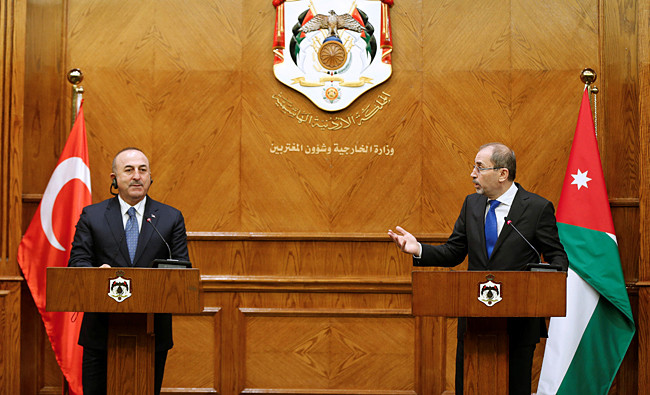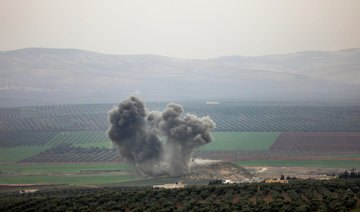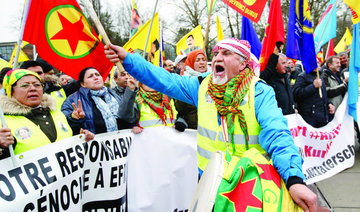ANKARA: The Syrian regime is on the verge of deploying pro-government forces to help Kurdish rebels caught up in a Turkish offensive in the north of the country, opening a new front in a conflict that is threatening to escalate across the wider region.
Syrian state media reported yesterday that militias backed by the regime of President Bashar Assad will soon be sent to the district of Afrin, near Aleppo, in an attempt to counter Turkey’s assault on the area.
News of the plan brought an immediate reaction from Ankara, which warned that any attempt to protect the Kurdish fighters of the People’s Protection Units, known as the YPG, would fail.
The deployment of the pro-Assad forces comes at a particularly delicate time, with much of the region balanced on a knife edge as outside powers including Israel, Iran, Russia and the US all compete for leverage in the Syrian civil war
Turkey’s offensive, “Operation Olive Branch,” began on Jan. 20, with the aim of targeting Kurdish militants, including members of the YPG and the Kurdistan Workers’ Party, or PKK. Turkey views both groups as terrorist organizations and threats to its sovereignty, but Washington has provided the YPG with military and logistical support in the fight against Daesh.
Analysts told Arab News that any alliance between Damascus and the Kurds in Afrin would add a further layer of complexity to an already complicated situation.
Middle East researcher Mete Sohtaoglu, who predicted this latest development in an interview with Arab News last month, said Ankara would not be pressured into ending its offensive early.
“Throughout the operation, Turkey has always set up observation and military posts in the areas it has captured so it cannot be expected to withdraw immediately,” he said.
Damascus has traditionally regarded Kurdish rebels in the country warily and the two sides have often clashed since the Syrian civil war began on the back of a wave of peaceful civil unrest against the Assad regime in 2011.
But they have also shown a willingness to work together when it suits their mutual interests and Sohtaoglu claimed the YPG recently agreed to hand over its heavy weapons to the Syrian government in exchange for military support. This could assuage Ankara’s fears that the arms would otherwise end up in the hands of the PKK, he said.
On a visit to Jordan, Turkey’s Foreign Minister, Mevlut Cavusoglu, told journalists in Amman on Monday that Ankara was still assessing the intentions of the Assad regime.
“If the regime is entering (Afrin) to oust the PKK, YPG, there is no problem,” he said. “But if they are entering to protect the YPG, then no one can stop us and Turkish soldiers.”
Also on Monday, Turkish President Recep Tayyip Erdogan discussed the situation in Afrin in a phone conversation with his Iranian counterpart, Hassan Rouhani.
Turkey claims that more than 1,600 YPG and Daesh fighters have either been killed, captured or surrendered since “Operation Olive Branch” began. However, the US has warned Ankara not to expand the offensive against its Kurdish allies.
Sohtaoglu told Arab News that a direct military confrontation between Turkish forces and the Assad regime would probably be avoided with the help of mediation from Moscow.
He predicted that “Russian soldiers may be deployed” around Afrin to create a buffer zone between the two sides. Any such move would be yet another sign that the Syrian conflict has degenerated into a proxy war for competing regional powers.
Earlier this month, Iranian militias killed one Turkish soldier and injured five others in an attack on an outpost in Idlib province, southwest of Aleppo city.
Soon afterwards Israel launched a large-scale air raid near Damascus after one of its fighter aircraft was downed by Syrian anti-aircraft fire. Meanwhile, Israeli Prime Minister Benjamin Netanyahu has accused Iran of using its long-term alliance with the Assad regime to try to build a “continuous empire surrounding the Middle East.”
Emre Ersen, a Syria analyst at Marmara University in Istanbul, told Arab News that the Syrian government’s decision to send forces to Afrin needed to be seen within this wider context. Moscow, in particular, stood to benefit from the move, he said.
“We already know that Russia has been uneasy about the implications of ‘Operation Olive Branch’ from the beginning. Nevertheless, it felt obliged to approve Turkey’s military operation in Afrin in order not to alienate Ankara at a time when Turkish-US relations were strained due to the YPG issue,” he said.
Syrian forces prepare to back rebels against Turkish offensive
Syrian forces prepare to back rebels against Turkish offensive

Cancer-hit UK king hails doctors in Christmas speech

Speaking in a pre-recorded message from a former hospital chapel, the king paid tribute to medical staff, veterans and humanitarian workers, and touched upon topics ranging from global conflicts to the far-right riots in the UK this summer.
The monarch’s traditional Christmas message, the first in nearly two decades made outside a royal residence, was symbolically filmed in the ornate Fitzrovia Chapel in central London.
“I offer special heartfelt thanks to the selfless doctors and nurses who this year have supported me and other members of my family through the uncertainties and anxieties of illness, and have helped provide the strength, care and comfort we have needed,” Charles, 76, said.
“I am deeply grateful too to all those who have offered us their own kind words of sympathy and encouragement,” the king added.
His daughter-in-law Princess Catherine was also diagnosed with cancer just weeks after him, temporarily removing the two senior royals from frontline duties.
They have gradually resumed engagements, with Kate, as she is widely known, announcing she had completed chemotherapy in September. Charles is still undergoing regular treatment for cancer, expected to continue into 2025.
Charles, who became monarch in 2022 after the death of his mother Queen Elizabeth II, also hailed the country’s response to divisive far-right riots that took place across England in August and September following the fatal stabbing of three young girls.
“I felt a deep sense of pride here in the United Kingdom when in response to anger and lawlessness in several towns this summer, communities came together not to repeat these behaviors, but to repair,” Charles said.
Calling for peace, the king reflected on conflicts across the world in a year which also marked the 80th anniversary of the D-Day landings.
“During previous (D-Day) commemorations, we were able to console ourselves with the thoughts that these tragic events seldom happen in the modern era,” said Charles.
“But on this Christmas Day, we cannot help but think of those for whom the devastating effects of conflict in the Middle East, in Central Europe, in Africa and elsewhere, pose a daily threat to so many people’s lives and livelihoods.”
Charles praised the “diversity of culture, ethnicity and faith” in Commonwealth countries, after attending a summit in Samoa in October.
“Across the Commonwealth, we are held together by a willingness to listen to each other,” Charles added, as the bloc increasingly confronts the legacy of slavery and colonialism under the former empire.
The eco-conscious king notably did not address climate change or environmental concerns this time around, in a shift from last year’s address.
However, in the backdrop of the broadcast was a live Christmas tree that was later donated and replanted, a tradition begun by Charles in 2023.
The king ended the speech with a call for “peace on earth.”
“And so it is with this in mind that I wish you and all those you love a most joyful and peaceful Christmas,” he concluded.
In keeping with tradition, Charles and his wife Queen Camilla, 77, were joined by other senior royals for their annual festive gathering at the family’s Sandringham estate in eastern England.
Heir-to-the-throne Prince William and Kate along with their three children were part of the royal entourage attending a morning church service followed by Christmas lunch.
Disgraced Prince Andrew, however, was missing from the festivities after revelations of his dealings with a suspected Chinese spy emerged just weeks earlier.
The king’s younger brother was present at last year’s gathering despite being shunned from royal life over his ties to convicted sex offender Jeffrey Epstein.
Also missing were Prince Harry and his wife Meghan — who quit royal life in 2020 and moved to California — making it the sixth royal Christmas they have missed in a row.
Hamas says ‘new’ Israeli conditions delaying agreement on Gaza ceasefire

- “Occupation has set new conditions concerning withdrawal (of troops), the ceasefire, prisoners, and the return of displaced people,” Hamas said
JERUSALEM: Hamas accused Israel on Wednesday of imposing “new conditions” that it said were delaying a ceasefire agreement in the war in Gaza, though it acknowledged negotiations were still ongoing.
Israel has made no public statement about any new conditions in its efforts to secure the release of hostages seized on October 7, 2023.
Indirect talks between Israel and Hamas, mediated by Qatar, Egypt and the United States, have taken place in Doha in recent days, rekindling hope for a truce deal that has proven elusive.
“The ceasefire and prisoner exchange negotiations are continuing in Doha under the mediation of Qatar and Egypt in a serious manner... but the occupation has set new conditions concerning withdrawal (of troops), the ceasefire, prisoners, and the return of displaced people, which has delayed reaching an agreement,” the Palestinian militant group said in a statement.
Hamas did not elaborate on the conditions imposed by Israel.
On Monday, Israeli Prime Minister Benjamin Netanyahu told parliament that there was “some progress” in the talks, and on Tuesday his office said Israeli representatives had returned from Qatar after “significant negotiations.”
Last week, Hamas and two other Palestinian militant groups — Islamic Jihad and the leftist Popular Front for the Liberation of Palestine — said in a rare joint statement that a ceasefire agreement was “closer than ever,” provided Israel did not impose new conditions.
Efforts to strike a truce and hostage release deal have repeatedly failed over key stumbling blocks.
Despite numerous rounds of indirect talks, Israel and Hamas have agreed just one truce, which lasted for a week at the end of 2023.
Negotiations have faced multiple challenges since then, with the primary point of disagreement being the establishment of a lasting ceasefire in Gaza.
Another unresolved issue is the governance of post-war Gaza.
It remains a highly contentious issue, including within the Palestinian leadership.
Israel has said repeatedly that it will not allow Hamas to run the territory ever again.
In an interview with The Wall Street Journal last week, Netanyahu said: “I’m not going to agree to end the war before we remove Hamas.”
He added Israel is “not going to leave them in power in Gaza, 30 miles from Tel Aviv. It’s not going to happen.”
Netanyahu has also repeatedly stated that he does not want to withdraw Israeli troops from the Philadelphi Corridor, a strip of land cleared and controlled by Israel along Gaza’s border with Egypt.
The war in Gaza was sparked by Hamas’s unprecedented October 7 attack on Israel, during which militants seized 251 hostages.
Ninety-six of them are still being held in Gaza, including 34 the army says are dead.
The attack resulted in 1,208 deaths, mostly civilians, according to an AFP tally of Israeli official figures.
Israel’s retaliatory campaign has killed at least 45,361 people in Gaza, a majority of them civilians, according to figures from the Hamas-run territory’s health ministry that the UN considers reliable.
Syria authorities say torched 1 million captagon pills

- Captagon is a banned amphetamine-like stimulant that became Syria’s largest export during the country’s more than 13-year civil war
- Stimulant has flooded the black market across the region in recent years
DAMASCUS: Syria’s new authorities torched a large stockpile of drugs on Wednesday, two security officials told AFP, including one million pills of captagon, whose industrial-scale production flourished under ousted president Bashar Assad.
Captagon is a banned amphetamine-like stimulant that became Syria’s largest export during the country’s more than 13-year civil war, effectively turning it into a narco state under Assad.
“We found a large quantity of captagon, around one million pills,” said a balaclava-wearing member of the security forces, who asked to be identified only by his first name, Osama, and whose khaki uniform bore a “public security” patch.
An AFP journalist saw forces pour fuel over and set fire to a cache of cannabis, the painkiller tramadol, and around 50 bags of pink and yellow captagon pills in a security compound formerly belonging to Assad’s forces in the capital’s Kafr Sousa district.
Captagon has flooded the black market across the region in recent years.
“The security forces of the new government discovered a drug warehouse as they were inspecting the security quarter,” said another member of the security forces, who identified himself as Hamza.
Authorities destroyed the stocks of alcohol, cannabis, captagon and hashish in order to “protect Syrian society” and “cut off smuggling routes used by Assad family businesses,” he added.
Syria’s new rulers have yet to spell out their policy on alcohol, which has long been widely available in the country.
Since a militant alliance toppled Assad on December 8 after a lightning offensive, Syria’s new authorities have said massive quantities of captagon have been found in former government sites around the country, including security branches.
AFP journalists in Syria have seen fighters from Hayat Tahrir Al-Sham (HTS) set fire to what they said were stashes of captagon found at facilities once operated by Assad’s forces.
Security force member Hamza confirmed Wednesday that “this is not the first initiative of its kind — the security services, in a number of locations, have found other warehouses... and drug manufacturing sites and destroyed them in the appropriate manner.”
Maher Assad, a military commander and the brother of Bashar Assad, is widely accused of being the power behind the lucrative captagon trade.
Experts believe Syria’s former leader used the threat of drug-fueled unrest to put pressure on Arab governments.
Jordan in recent years has cracked down on the smuggling of weapons and drugs including captagon along its 375-kilometer (230-mile) border with Syria.
UK to host Israel-Palestine peace summit

- PM Starmer drawing on experience working on Northern Ireland peace process
- G7 fund to unlock financing for reconciliation projects
LONDON: The UK will host an international summit early next year aimed at bringing long-term peace to Israel and Palestine, The Independent reported.
The event will launch the International Fund for Israeli-Palestinian Peace, which is backed by the Alliance for Middle East Peace, containing more than 160 organizations engaged in peacebuilding between Israelis and Palestinians.
Prime Minister Keir Starmer, a former human rights lawyer who worked on the Northern Ireland peace process, ordered Foreign Secretary David Lammy to begin work on hosting the summit.
The fund being unlocked alongside the summit pools money from G7 countries to build “an environment conducive to peacemaking.” The US opened the fund with a $250 million donation in 2020.
As part of peacebuilding efforts, the fund supports projects “to help build the foundation for peaceful co-existence between Israelis and Palestinians and for a sustainable two-state solution.”
It also supports reconciliation between Arab and Jewish citizens of Israel, as well as the development of the Palestinian private sector in the West Bank and Gaza Strip.
Young Israelis and Palestinians will meet and work together during internships in G7 countries as part of the scheme.
Former Labour Shadow Middle East Minister Wayne David and ex-Conservative Middle East Minister Alistair Burt said the fund is vital in bringing an end to the conflict.
In a joint piece for The Independent, they said: “The prime minister’s pledge reflects growing global momentum to support peacebuilding efforts from the ground up, ensuring that the voices of those who have long worked for equality, security and dignity for all are not only heard, but are actively shaping the societal and political conditions that real conflict resolution will require.
“Starmer’s announcement that the foreign secretary will host an inaugural meeting in London to support peacebuilders is a vital first step … This meeting will help to solidify the UK’s role as a leader in shaping the future of the region.”
The fund is modeled on the International Fund for Ireland, which spurred peacebuilding efforts in the lead-up to the 1999 Good Friday Agreement. Starmer is drawing inspiration from his work in Northern Ireland to shape the scheme.
He served as human rights adviser to the Northern Ireland Policing Board from 2003-2007, monitoring the service’s compliance with human rights law introduced through the Good Friday Agreement.
David and Burt said the UK is “a natural convener” for the new scheme, adding: “That role is needed now more than ever.”
They said: “The British government is in a good position to do this for three reasons: Firstly, the very public reaching out to diplomatic partners, and joint ministerial visits, emphasises the government turning a page on its key relationships.
“Secondly, Britain retains a significant influence in the Middle East, often bridging across those who may have differences with each other. And, thirdly, there is the experience of Northern Ireland.
“Because of his personal and professional engagement with Northern Ireland, Keir Starmer is fully aware of the important role civil society has played in helping to lay the foundations for peace.”
Erdogan announces plans to open Turkish consulate in Aleppo

- Erdogan also issued a stern warning to Kurdish militants in Syria
Turkish President Recep Tayyip Erdogan announced on Wednesday that Turkiye will soon open a consulate in Syria's Aleppo.
Erdogan also issued a stern warning to Kurdish militants in Syria, stating they must either "lay down their weapons or be buried in Syrian lands with their weapons."
The remarks underscore Turkiye's firm stance on combating Kurdish groups it views as a threat to its national security.


















